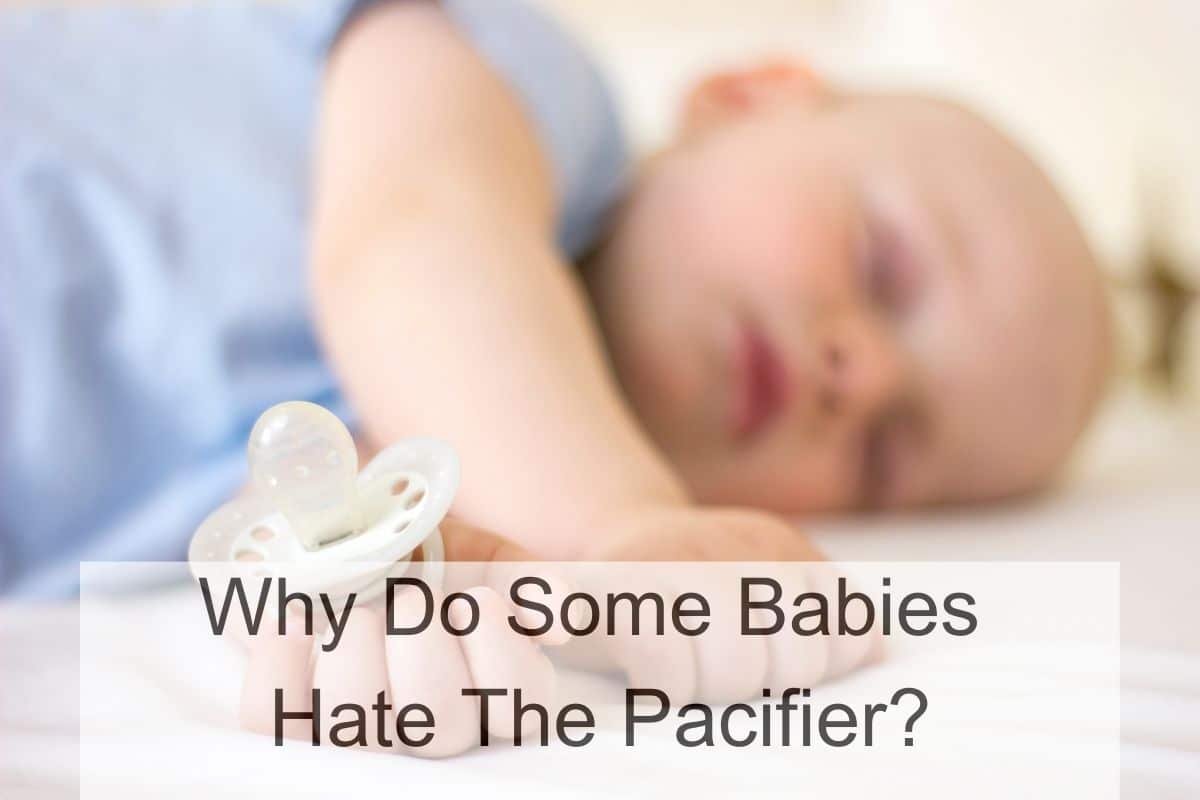As a new parent, I was excited to introduce my baby to a pacifier as a way to soothe them. However, I quickly discovered that not all babies take to pacifiers. In fact, some babies outright hate them! This can be frustrating for parents who are looking for ways to calm their fussy little ones.

So why do some babies hate the pacifier? There are several reasons. For one, some babies simply prefer the real thing. The natural shape and feel of a mother’s breast or the familiar feel of a bottle nipple might be more comforting to your baby than a pacifier. Additionally, some babies may not like the texture or taste of the pacifier, which can make it unappealing to them. Finally, some babies may have a strong sucking reflex and find that the pacifier doesn’t satisfy their need to suck as effectively as breastfeeding or bottle-feeding.
Understanding Pacifier Aversion

As a Pediatrician, I have seen many babies who refuse to take a pacifier, leaving their parents perplexed and frustrated. Pacifier aversion is a common issue and there are various reasons why a baby may dislike a pacifier. In this section, I will discuss two possible reasons why some babies may hate the pacifier: natural suckling preference and sensory processing differences.
Natural Suckling Preference
Babies have an innate desire to suckle as it is a natural reflex that helps them feed and soothe themselves. However, not all babies have the same suckling preference. Some babies prefer the breast or bottle over a pacifier because of the difference in shape and texture. Breastfeeding or bottle-feeding provides a different sensation than a pacifier, which may be more comforting to some infants. Additionally, some babies may prefer to suckle only when they are hungry, rather than when they are seeking comfort.
Sensory Processing Differences
Another reason why some babies may hate the pacifier is due to sensory processing differences. Babies have different sensory processing abilities, and some may be more sensitive to certain textures, tastes, or smells. For example, some babies may be sensitive to the rubbery texture of the pacifier, or the taste of the pacifier material. Similarly, some infants may be more sensitive to the smell of the pacifier, which may be off-putting to them.
Impact of Pacifier Use on Babies

As a pediatrician, I have seen many parents who swear by pacifiers for their babies. However, not all babies take to pacifiers so easily. In fact, some babies downright hate them! In this section, I will discuss the impact of pacifier use on babies, including oral development concerns and breastfeeding interference.
Oral Development Concerns
While pacifiers can be helpful for soothing a fussy baby, prolonged use can have negative effects on oral development. According to the American Dental Association, pacifier use beyond the age of two can lead to dental problems such as misaligned teeth and bite issues. Additionally, overuse of pacifiers can cause problems with speech development, as the constant sucking motion can interfere with the tongue and mouth muscles needed for proper speech.
Breastfeeding Interference
Another concern with pacifier use is the potential interference with breastfeeding. While some studies have shown that pacifier use can reduce the risk of Sudden Infant Death Syndrome (SIDS) during sleep, it is important to note that pacifiers should not be introduced until breastfeeding is well-established. Pacifier use can cause nipple confusion, leading to difficulties with breastfeeding and a decrease in milk supply.
Parental Influence on Pacifier Acceptance

As a parent, you may wonder why your baby hates the pacifier. One possible reason is inconsistent pacifier introduction. If you introduce the pacifier too early or too late, your baby may not accept it. According to Mayo Clinic, the ideal time to introduce the pacifier is between 3 to 4 weeks after birth. This is when your baby has learned to breastfeed or bottle-feed.
Another factor that can affect pacifier acceptance is parental response to pacifier rejection. If your baby rejects the pacifier, you may feel frustrated and tempted to force it on them. However, this can backfire and make your baby associate the pacifier with negative feelings. Instead, try different pacifier brands and shapes until you find one that your baby likes. You can also try offering the pacifier during different times of the day or when your baby is in different moods.
Addressing Pacifier Rejection

As a parent, it can be frustrating when your baby refuses to take a pacifier. However, there are a few things you can try to help them adapt:
Alternative Soothing Techniques
If your baby doesn’t like pacifiers, it’s important to have alternative soothing techniques in your parenting toolbox. You can try swaddling, rocking, or singing to your baby. Skin-to-skin contact can also be very comforting for babies. Additionally, you can try using a different type of pacifier. Some babies prefer pacifiers that are shaped differently or made from different materials.
Timing and Persistence in Offering
It’s important to offer the pacifier at the right time. If your baby is hungry or upset, they may not be interested in the pacifier. Wait until they are calm and relaxed before offering it. Additionally, it’s important to be persistent. Some babies may take a while to get used to the pacifier, so keep offering it at different times throughout the day.
When to Consult a Professional
As a parent, it can be frustrating when your baby refuses to take a pacifier. However, it’s important to remember that every baby is different and has their own preferences. In some cases, a baby’s aversion to pacifiers may be a sign of an underlying issue that requires professional attention.
Signs of Underlying Issues
If your baby consistently refuses a pacifier and shows signs of discomfort or distress, it may be time to consult a professional. Some signs to look out for include:
- Excessive crying or fussiness
- Difficulty sleeping or staying asleep
- Refusal to breastfeed or bottle-feed
- Difficulty gaining weight
- Signs of pain or discomfort, such as pulling at ears or arching back
Expert Recommendations
According to Mayo Clinic, “Most babies have a strong sucking reflex. Some babies even suck their thumbs or fingers before they’re born. Beyond that, however, the reasons why some babies take to pacifiers and others don’t remain a mystery.” However, there are some expert recommendations that may help your baby adapt to a pacifier:
- Offer the pacifier when your baby is calm and relaxed, such as after a feeding or when they’re drowsy.
- Try different types of pacifiers to find one that your baby prefers.
- Use a pacifier clip to keep the pacifier in place and prevent it from falling out of your baby’s mouth.
- Avoid using a pacifier as a substitute for feeding or as a way to delay feedings.

